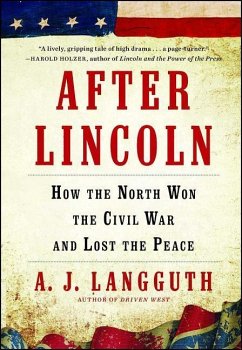A brilliant evocation of the post-Civil War era by the acclaimed author of Patriots and Union 1812. After Lincoln tells the story of the Reconstruction, which set back black Americans and isolated the South for a century. With Lincoln’s assassination, his “team of rivals,” in Doris Kearns Goodwin’s phrase, was left adrift. President Andrew Johnson, a former slave owner from Tennessee, was challenged by Northern Congressmen, Radical Republicans led by Thaddeus Stephens and Charles Sumner, who wanted to punish the defeated South. When Johnson’s policies placated the rebels at the expense of the black freed men, radicals in the House impeached him for trying to fire Secretary of War Edwin Stanton. Johnson was saved from removal by one vote in the Senate trial, presided over by Salmon Chase. Even William Seward, Lincoln’s closest ally, seemed to waver. By the 1868 election, united Republicans nominated Ulysses Grant, Lincoln's winning Union general. The night of his victory, Grant lamented to his wife, “I’m afraid I’m elected.” His attempts to reconcile Southerners with the Union and to quash the rising Ku Klux Klan were undercut by post-war greed and corruption. Reconstruction died unofficially in 1887 when Republican Rutherford Hayes joined with the Democrats in a deal that removed the last federal troops from South Carolina and Louisiana. In 1964, President Lyndon Johnson signed a bill with protections first proposed in 1872 by the Radical Senator from Massachusetts, Charles Sumner.
Bitte wählen Sie Ihr Anliegen aus.
Rechnungen
Retourenschein anfordern
Bestellstatus
Storno

